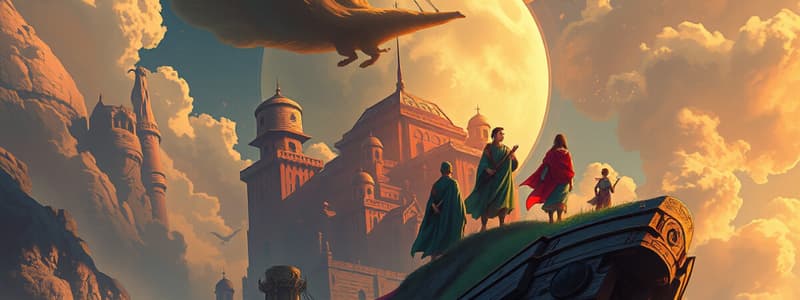Podcast
Questions and Answers
What does Fernand Braudel suggest about towns and cities in relation to civilization?
What does Fernand Braudel suggest about towns and cities in relation to civilization?
- They impede the development of civilization.
- They are unimportant for the structure of civilization.
- They exist independently of civilization.
- They thrive and prosper within a civilization. (correct)
According to V. Gordon Childe, what were the two revolutions that marked the emergence of civilization?
According to V. Gordon Childe, what were the two revolutions that marked the emergence of civilization?
- Commercial Revolution and Cultural Revolution.
- Industrial Revolution and Technological Revolution.
- Agricultural Revolution and Scientific Revolution.
- Neolithic Revolution and Urban Revolution. (correct)
What was a significant result of the Neolithic Revolution according to Childe?
What was a significant result of the Neolithic Revolution according to Childe?
- The creation of agrarian surplus. (correct)
- The establishment of nomadic tribes.
- The decrease in population density.
- The immediate invention of advanced technology.
What does social stratification in a civilization imply?
What does social stratification in a civilization imply?
What role does centralized power play in the definition of civilization as discussed in the content?
What role does centralized power play in the definition of civilization as discussed in the content?
What is the primary focus of the ethnographers and anthropologists when discussing primitive societies?
What is the primary focus of the ethnographers and anthropologists when discussing primitive societies?
According to Fernand Braudel, how does culture relate to civilization?
According to Fernand Braudel, how does culture relate to civilization?
What approach does Immanuel Wallerstein take regarding the distinction between culture and civilization?
What approach does Immanuel Wallerstein take regarding the distinction between culture and civilization?
What does Philip Bagby consider to be the primary elements in a city?
What does Philip Bagby consider to be the primary elements in a city?
Which of the following best describes Edward Burnett Tylor's view on civilization?
Which of the following best describes Edward Burnett Tylor's view on civilization?
How do civilizations contribute to a group's identity?
How do civilizations contribute to a group's identity?
What is the key distinction made by anthropologists between culture and civilization?
What is the key distinction made by anthropologists between culture and civilization?
What does Christopher Dawson view civilization as?
What does Christopher Dawson view civilization as?
Flashcards are hidden until you start studying
Study Notes
Relationship Between Civilization and Culture
- Civilization and culture are interrelated but distinct concepts, exhibiting unique characteristics while overlapping.
- Civilizations comprise various interwoven cultures that constantly interact and share values and institutions.
- Ethnographers and anthropologists maintain a distinction between civilization and culture, dating back to Edward Burnett Tylor’s work in 1874.
- Tylor defined civilization as a developed stage of human society, preferring the term "culture" for the study of primitive societies.
- Culture can be viewed as an attribute of civilization or as a conglomerate of the cultures within a civilization.
- Fernand Braudel views culture as 'semi-civilization', suggesting it occupies a lower status than civilization.
Hierarchical Perspectives on Civilization and Culture
- Christopher Dawson considers civilization to be the most extensive socio-historical phenomenon, elevating its status over culture.
- Immanuel Wallerstein challenges this hierarchical perspective, using German interpretations where 'civilization' pertains to everyday matters and 'culture' signifies refined elements.
- American anthropologist Philip Bagby takes an etymological view, linking civilization specifically to urban culture, highlighting the role of cities in civilizational studies.
Key Attributes of Civilization
- Bagby identifies primary attributes of civilization as the division of labor and craft specialization essential to cities.
- Braudel supports this, asserting that cities thrive within civilizations, distinguishing them from the broader concept of culture.
- Nowadays, a civilization is commonly understood as a complex entity with social stratification, specialized labor, and centralized power.
Emergence of Civilization
- V. Gordon Childe theorized the emergence of civilization resulted from two key revolutions: the Neolithic and the Urban Revolutions.
- The Neolithic Revolution marked a shift to agriculture and surplus production, laying the groundwork for civilization.
- Childe argued surplus production led to technological advancements and wealth accumulation, causing class stratification.
Studying That Suits You
Use AI to generate personalized quizzes and flashcards to suit your learning preferences.




